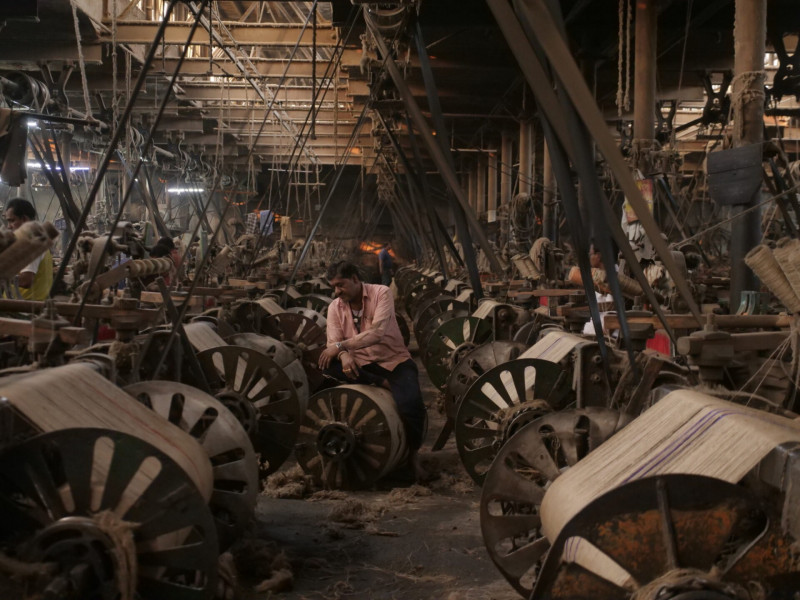Le Fil d'or
-
Réalisé par Nishtha Jain • Écrit par Nishtha Jain, Deborah Matzner
-
Inde, Norvège, Pays-Bas, Royaume-Uni, Bosnie-Herzégovine • 2022 • 90 minutes & 52 minutes • Couleur
- Réalisation :
Nishtha Jain - Écriture :
Nishtha Jain, Deborah Matzner - Assistanat de réalisation :
Moinak Guho - Image :
Rakesh Haridas - Son :
Partha Burman, Kalhan Raina, Kinkini Deb - Montage :
Alexander Goekjian, Nishtha Jain - Musique originale :
Kenneth Ishak - Mixage :
Souvik Phukan, Imran Saifee - Étalonnage :
Dylan Richard Hopkin - Montage son :
Jithin Jose - Sound design :
Niraj Gera
- Production (personne) :
Nishtha Jain, Irena Taskovski, Frank van den Engel, Fabien Greenberg, Bård Kjøge Rønning, Morana Ikić Komljenović - Production (structure) :
Raintree Films - Coproduction :
Taskovski Films Ltd., Zeppers Films & TV, Antipode Films As, Kolek Doo Dokudum - Diffuseur :
France Télévisions, Al Jazeera - Ayant droit :
Raintree Films - Accès au fichier des sous-titres français :
La Cinémathèque du documentaire
- N° ISAN :
non renseigné
Résumé
Près de Calcutta, portrait d'une usine-ville, peuplée de milliers d'ouvriers et de machines vieilles d'un siècle. On y transforme le jute. Un lieu hors du temps, à la beauté fascinante mais aux cadences folles qui minent le quotidien des employés et broient souvent leurs espoirs et leurs rêves.
Outside Kolkata, jute mills crank on, virtually unchanged since the industrial revolution, perpetuating harsh working conditions but offering an ecologically sustainable alternative to plastic. Following jute work alongside the creative labour of the film’s own making, The Golden Thread puts the analogue and digital, the early industrial and post-industrial, into experimental recombination and asks whether an alternative future can emerge from the near dystopian present.
"In the heyday of the jute industry, millions of people in Bengal made their living doing this laborious work, which has hardly changed since the industrial revolution. The 100-year-old machinery has been endlessly repaired. State aid kept this sustainable alternative to plastic going, but its future looks bleak.
In beautifully composed shots, Nishtha Jain shows the last vestiges of the industry. She follows the entire production chain, from cutting and drying the reed along the river to weaving in two of the biggest mills in the area. Along endless rows of antique looms, the air thick with dusty fibers, workers carry out their routine work. Accidents and jammed machines are commonplace; workers’ faces reveal the exhaustion of a lifetime of labour.
Meanwhile, the union is fighting for a minimum wage equivalent to 250 US dollars a month. During their break, the workers speak out. "Nowadays nobody cares about quality, just more production", says one. Not long afterwards, one of the mills closes its doors after more than a hundred years."
(IDFA - International Documentary Festival Amsterdam)
Mot(s)-clé(s) thématique(s)
Sélections et distinctions
- 2023 • FIPADOC - Festival International Documentaire • Biarritz (France) • Compétition Documentaire international
- 2023 • Festival International Jean Rouch - Voir autrement le monde • Paris (France) • Sélection officielle "Cap sur l'environnement"
- 2023 • DOC-Cévennes - Festival International du Documentaire en Cévennes • Lasalle (France) • Sélection
- 2023 • DOXA Documentary Film Festival • Vancouver (Canada) • Mention spéciale du jury
- 2022 • IDFA - International Documentary Festival Amsterdam • Amsterdam (Pays-Bas) • Section Masters - Première mondiale
Comment avoir accès au film ?
- Sortie en salle
-
Édition DVD
- Il n'existe pas d'édition DVD à notre connaissance
-
Accès VOD
- Il n'existe pas d'accès en VOD à notre connaissance
- Distribution
- Aide sur les moyens d'accéder à un film


